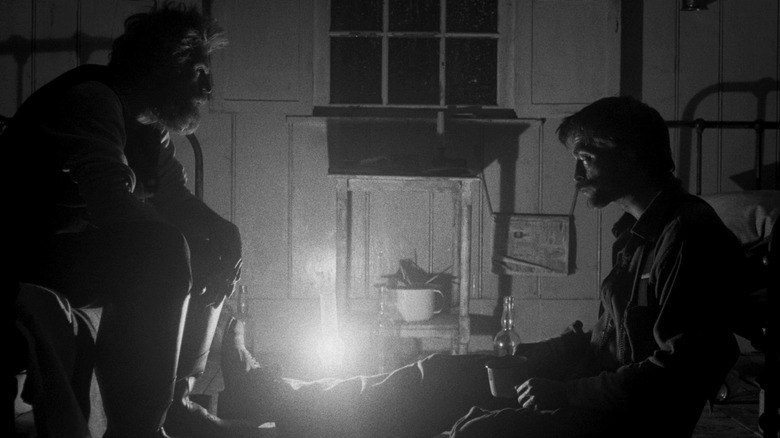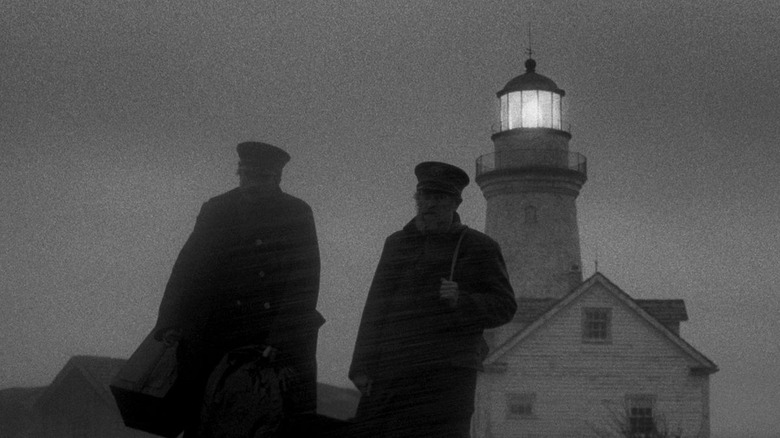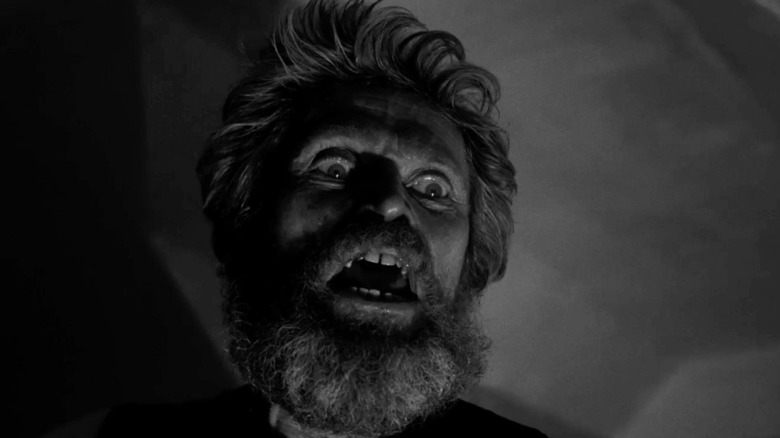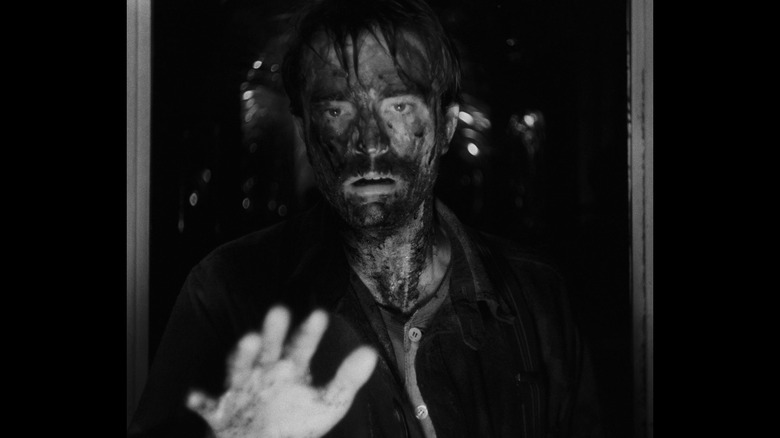The Lighthouse Is A Christmas Movie
"Night, and especially Christmas night, is the best time to listen to a ghost story. Throw on the logs! Draw the curtains! Move your chairs nearer the fire and hearken!" – Frederick Manley, "The Ghost of the Cross-Roads." Published in 1893.
"There'll be scary ghost stories, and tales of the glories of Christmases long, long ago." So says the 1963 song "It's the Most Wonderful Time of the Year" written by Edward Pola and George Wyle. That tune has become so ingrained in the fabric of the holiday season that most people don't put much thought into the lyrics, and probably never stop to think about how odd it is to talk about "scary ghost stories" during Christmastime. But ghost stories used to be an integral part of the holiday. When Charles Dickens wrote "A Christmas Carol," he wasn't exactly breaking new ground. He was merely contributing to the Victorian-era tradition of gathering around to tell tales of terror on cold winter nights.
As humorist Jerome K. Jerome wrote in 1891:
"Whenever five or six English-speaking people meet round a fire on Christmas Eve, they start telling each other ghost stories. Nothing satisfies us on Christmas Eve but to hear each other tell authentic anecdotes about spectres. It is a genial, festive season, and we love to muse upon graves, and dead bodies, and murders, and blood."
The tradition actually goes back even beyond the Victorian era, but it's so readily associated with that time period because of Dickens. "In Victorian England, it was a common practice for families to tell ghost stories at Christmas time," said Justin McDaniel, a professor and chair of religious studies. "Of course, Christmas as celebrated in Europe and the U.S. was originally connected to the 'pagan' Winter Solstice celebration and the festival known as Yule. The darkest day of the year was seen by many as a time when the dead would have particularly good access to the living. In all cultures, there have been both protective and menacing ghosts."
And it's with that mentality in mind that I come to you with a potentially questionable claim: "The Lighthouse" is a Christmas movie. No, it's not a Christmas movie in the sense that it takes place on Christmas, or even features Christmas somewhere in its story. Instead, Robert Eggers' black and white, darkly comedic tale of insanity feels like it would be the perfect tale to chill your bones on a cold Christmas Eve. The type of ghostly story that would sound great told by a roaring fire, with mulled wine or other spirits being contemplatively ingested. It is often gruesome, and that's just fine, because as Henry James wrote at the beginning of "The Turn of the Scew," gruesome is exactly what "a strange tale should essentially be" on Christmas.
Midwinter Ghosts
While tales of the beyond were originally passed down via oral tradition, the popularity of periodical presses paved the way for them to be written down. As Kira Cochrane wrote in The Guardian: "Ghost stories had traditionally been an oral form, but publishers suddenly needed a mass of content, and ghost stories fitted the bill – short, cheap, generic, repetitive, able to be cut quite easily to length." And as Tara Moore wrote in the introduction to "The Valancourt Book of Victorian Christmas Ghost Stories":
"The real wellspring of Victorian Christmas spectres was the magazine. Periodicals began printing special Christmas numbers or simply tailoring their December and January numbers for Christmas reading, and that meant ghosts ... Readers wanted to read ghosts at Christmas, so that meant that authors dreamed up midwinter ghosts over the summer and into the early fall, preparing the way for those spooky holiday chills."
Over the years, Christmas had fallen out of favor in England thanks primarily to uber-Puritan Oliver Cromwell, who had no stomach for that sort of nonsense. During the Industrial Revolution, folks worked constantly and there were almost no days off, which meant that no one had time to think about Christmas. Then, a curious thing happened. In 1863, Charles Dickens published "A Christmas Carol." Dickens' tale of ghosts visiting a miserable miser on Christmas arrived around the time that businesses were hoping to create a new commercial holiday. At the same time, the first commercially-produced Christmas cards arrived on the scene. All of these details coalesced, and soon, Christmas was back, in a big way. Which meant that people began gathering for the holiday all over again and sharing spooky ghost stories.
While Dickens' Christmas ghost tale had a moral at the center, others, like the work of M.R. James, Wilkie Collins, Henry James, and Algernon Blackwood, just to name a few, were less concerned with imparting a valuable lesson and more interested in giving readers (or, in the oral tradition, listeners) the heebie-jeebies. "The ethical intention which gave dignity to Dickens' Christmas stories of still earlier date has almost wholly disappeared," wrote William Dean Howells in 1886.
"The Lighthouse" would fit perfectly into this category of ghostly stories that are unconcerned with moralizing or imparting dignity. It feels like a story aching to be told out loud to an increasingly amused and horrified audience. With its whipping wind, bad omens, and men sharing deep, dark secrets, "The Lighthouse" unfolds like a metaphor-laced ghost story. There may not be any actual ghosts afoot in the film, but the presence of some sort of otherworldly entity haunts the frames of the film.
The Evocation of the Uncanny
As Cochrane writes, at the time Christmas ghost stories were becoming a big deal, "Lighting was often provided by gas lamps, which have also been implicated in the rise of the ghost story; the carbon monoxide they emitted could provoke hallucinations." Hallucinations (and lamps!) are a big part of "The Lighthouse," which traps two men on a lonely rock and invites us to watch them lose their minds. It's sometime in the 1890s, and Ephraim Winslow (Robert Pattinson) and Thomas Wake (Willem Dafoe) have arrived on an island off the coast of New England. Winslow, the younger and less experienced of the two men, is forced to partake in the more menial, back-breaking work while Wake, the old salt, seems to constantly be off on his own. Only he is allowed to tend to the light that blasts forth from the lighthouse on the island, much to Winslow's annoyance.
Both men are mysteries, and Winslow in particular has several dark secrets. And Wake has secrets, too. He seems obsessed with the light. In love with it, in fact. We see him nude up in the lighthouse, letting its god-like glow wash over him, casting him in ecstasy. As the days tick on, the men lose all sense of place and time. Winslow seems to be slowly going mad, and Wake seems to have gone mad a long time before he ever came to this island.
What's real, and what's imagined, is always unclear in "The Lighthouse," and that's part of what gives the film its eerie strength. While this isn't a ghost story in the traditional sense, it has all the makings of one. The black and white cinematography, shot with antique camera lenses, makes the entire endeavor feel like a dream – or a nightmare. It's as if the men's very presence on the island has summoned up untold horrors. "For us, the primary quality distinguishing the nineteenth century . . . is a great, cozy sense of security brought out all the more vividly by the evocation of the uncanny," wrote Joachim Kalka in the essay "Gaslight, Fog, Jack the Ripper," and the "evocation of the uncanny" feels like the perfect summation of "The Lighthouse."
And storytelling is a big part of the lunacy on display here; the type of storytelling that recalls those Victorians gathered around the hearth, spinning preternatural tales by flickering light. While the printed ghost story was popular at Christmas, traditionally, they were stories that were meant to be told aloud in order to thrill a listening audience. There are numerous moments throughout "The Lighthouse" where the two men sit, and talk, and talk, and talk. The talk is sometimes funny, sometimes horrifying, always strange. The wind howls and the waves crash outside, and the world feels lonely. And haunted.
Keepin' Secrets Eh?
The mundane, even comical nature of life on the island gives way to mania, creating a cacophony of confusion and horror. The atmosphere of the film, full of fog, and shadow, and water, and doom, is tangible. "Two ingredients most valuable in the concocting of a ghost story are the atmosphere and the nicely managed crescendo," wrote M. R. James. "Let us be introduced to the actors in a placid way; let us see them going about their ordinary business, undisturbed by forebodings, pleased with their surroundings; and into this calm environment let the ominous thing put its head, unobtrusively at first, and then more insistently, until it holds the stage."
The "nicely managed crescendo" here involves the two men locked in a battle to the death. Visions of mermaids (and mermen) give way to brawls, torment, and premature burials. Nothing is as it seems. And there is no real hope. The light from the lighthouse is not the light at the end of the tunnel; it's a burning star, a dead sun, a white-hot ember of regret and madness. "The Lighthouse" doesn't feature Christmas iconography or even a suggestion of the holiday – but it doesn't matter. When I say "The Lighthouse" is a Christmas movie, I mean it's something to watch on Christmas Eve. A ghost story full of shadows and fog, mystery and myth. The uncanny and the preternatural seep out through the frames of the film like the oil needed to keep the light aflame. The story here is the type of story that would pair nicely with a roaring fire as the cold December darkness sets in. It's all in good fun. When it's all over, you can go back to the festivities.
But that darkness will linger. It will cling to you like a stench. Make merry all you want, but in the end, you'll never be able to escape. Tell yourself it's all in good fun, and try to keep the things that go bump in the night at bay as long as you possibly can. Happy holidays. Remember to stay warm.



